Five years ago, I lost my father, and a few months ago, my mother moved to an apartment in a senior community. That left our house on a large wooded lot, empty of people but not of things. God knows, not of things. Before we could put it on the market, as my mother wished, we would have to clear out the remnants of our family, wipe it clean, and make it into a blank canvas onto which buyers could project their own lives.
That’s what brought my five siblings and me together earlier this month. The task of erasure.
The last time I’d been in the house, this past September, I had broken down in sobs. My siblings and I had been raised in that house. What happened inside those walls had shaped us for the rest of our lives. It had been an emotional base for almost my entire 62 years. But on that September day, after we’d moved out furniture to my mother’s new apartment, I was in the house alone, overwhelmed by the resounding silence in a place that had always—when I was living there or visiting from elsewhere—vibrated with energy and happiness.
I braced myself for more hurt over this weekend clean-out project with my siblings, ages 52 to 68, as we said goodbye to furniture, dishes, linens, wall hangings, knick knacks, and miscellanea that had defined our family for decades.
But the pain and tears didn’t come. It took me the whole weekend to figure out why. Instead, there was—what is this?—laughing and rich new stories to add to the family lore.
Read More: The Gentle Art of Swedish Death Cleaning
The Ground Rules
Five of the six of us traveled to the corner of East Tennessee for the house clean-out project. Two of my brothers drove in from Virginia, my younger sister from South Carolina. One brother came from his lake house in Virginia; my older sister lives about a block from our childhood home.
There was only one thing I truly longed for.
After lunch on Friday, we set out the plan for conquering this mauve-colored, split-level, four-bedroom space that was built in 1962. We established a system to help us work through the rooms. If we wanted to keep something for ourselves, we would put a green sticker on it with our initials. Yellow stickers were items for an estate sale. Pink was for things that we’d donate to charity. We had a pile for recycling and a pile for trash.
Our mother had taken many pieces of furniture with her to her new apartment and urged us all to claim any furniture or items we or our children particularly wanted. I claimed the guest bed, a desk, and an arm chair, but the only thing I truly longed for was my first car that was parked in the garage: a glorious, orange 1972 VW convertible, which my mother had bought from me when I was in need of cash as my husband and I started our family.
The Exercise Bike
We started our clean out on Friday afternoon in what we’d always called the recreation room. It was never shortened to rec room or den; we always spelled out all those syllables. This was where we lay around watching TV (e.g., Gilligan’s Island, I Love Lucy, and Hogan’s Heroes) almost every day after school and gathered at night for Mission Impossible, Hawaii Five-O, and Star Trek (the original).
We were making our way through old toys and books, and we’d made a unanimous decision to give away our old sofa (with the most tortuous 60-year-old fold-out twin mattresses). Then we needed to figure out what to do with our father’s exercise bike. My brother Jim looked it up on Google. “These go for $800 to $1,200 new,” he exclaimed.
“Does it still work?” my older brother Jack asked as he got on it.
Once I was on, I pushed hard, and to everyone’s surprise, the pedals began moving.
My mother had joined us by then. “Yes, the great-grandkids play on it all the time,” she said.
Jack tried to force his foot down on a pedal, but it wouldn’t move. He actually stood up on it, in vain. We all tried different dials and switches, hoping one would release the pedals.
“Here, let me try. I’ll get it going,” I said, not sure what was fueling my cockiness. Once I was on, I pushed hard, and to everyone’s surprise, the pedals began moving.
Jack, six years older than me, was aghast. “What the hell . . .”
While the rest of the family shrieked in laughter, I pedaled along for a couple of minutes, feeling quite happy with how my regular cycling workouts had paid off. “Oh, wow! This is one of our best family stories yet,” Jeff shouted.
Then suddenly the mechanism froze. Completely stopped. I then was mimicking what Jack had done to try to start the pedals earlier—stomping, standing up on the pedals. Now the joke was on me, and everyone cracked up at how my self-assurance had so quickly evaporated.
“Jeannie, too bad you were rubbing it in so much,” Jeff said between guffaws, “and didn’t stop two seconds earlier. Then we’d be talking about this forever.”
The Car
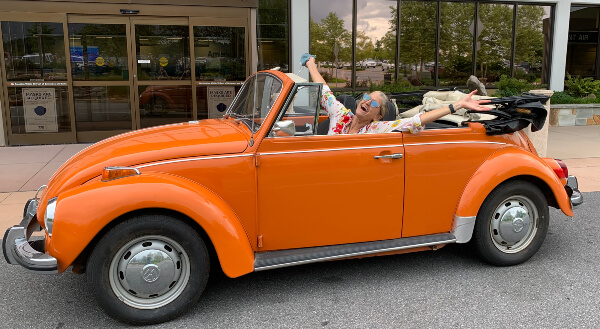
Me in my first car, which my mother bought from me when I was short on cash. Now I wanted it back.
Soon after the exercise bike incident, while the groups was talking about the fate of the family piano, I went to the garage to visit my beloved VW bug. It was a beauty; everything on the car, which had only clocked 52,000 miles, is original—the seat covers, the dashboard, the head lights, the wheels, and even the convertible top.
“So, should I go ahead and put my sticker on the bug now?” I asked when I walked back in the recreation room with a green sticker and pen in hand.
“What???” my older brother Jack exclaimed. “You’re not getting that.”
For many years the car had symbolized my freedom, my identity.
My mother laughed. “If you want to pay me what I paid you, you can have it.” She’d paid me $8,000 and had rebuilt the engine, but I didn’t want to part with the money at the moment.
“But it should come back to me. It was mine to start with. It means so much to me.” It had been my dream car, and for many years it had symbolized my freedom, my identity. (A lot of baggage for one car to carry, I realize.) Now that I was divorced and launching on the last third of my life, it seemed I needed it more than ever.
We were all smiling, but Jack, who fixes up motorcycles and cars for a hobby, was intent on selling it on an auto trader site for an estimated $16,000 and giving that money to mom.
“You should have bet him the car if you could get the exercise bike running,” Jeff said.
I shrugged and let it go, not wanting to be a pill. “Well,” I said, “maybe we’ll have to arm wrestle for it later.”
The Spoons
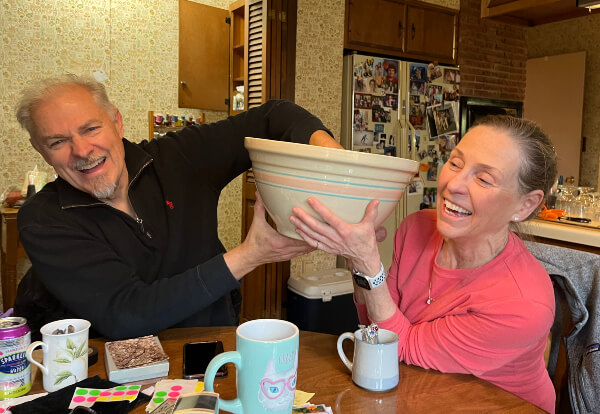
Jack pulling out a spoon while Janyce does the heavy lifting.
My father was in international sales, and we lived in Switzerland for four years when I was little. At some point in his and our family’s travels, my parents started a collection of souvenir spoons from countries all over the world. From the time I could remember, more than 100 spoons hung in special wood holders in our kitchen.
“How are we going to divide the spoons?” someone asked on Friday. No one had an answer. The spoons were in ways symbols of my family’s adventurous nature. I started examining the spoons and saw that there were many from countries I’d visited. Jeff and I were taking some favorites off the racks.
“We’ve got to do this systematically,” Jack said. “How about we put all the spoons in a bowl and pick from them?”
“Maybe we can each take one favorite before we put them in a bowl,” Jeff responded, eyeing a certain spoon from South Africa. My younger brother Jim suggested that we could do some spoon trades afterward.
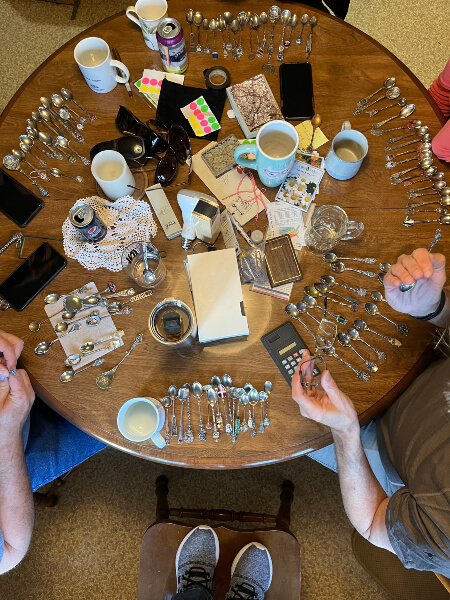
Our variation on the game Spoons.
The next afternoon, Saturday, all of us stopped in the middle of our work and hovered around the spoon collection to choose one. Jack magnanimously allowed the youngest, Judi, to go first. She picked a beautiful one with a rhinoceros painted on the concave part. Jim selected the spoon from Zug, Switzerland, where he was born during the four years our family lived there. I took one from Egypt because it was topped with a tiny, intricate version of the Sphinx. I had seen the Sphinx when my husband and two kids visited Egypt during the Arab Spring, making it one of the most exciting adventures of my life.
After we’d all taken our first picks, we sat down at the round kitchen table. We didn’t take the places we’d gravitated to growing up. Instead we sat in our age order. Jack, Janyce, Jeff, me, Jim, and Judi. We passed a massive bowl around, holding it high for the person next to us so that they couldn’t see in.
Many spoons prompted memories. The spoon from Portugal reminded us of the family trip when our mother was so mad about leaving our vacation early she opened the door of the moving taxi on the way to the airport. The one from Rome led to a memory of how hot it was when we visited as children and how my older sister and I dressed in matching blue-and-white checked dresses Mom had made. We groaned when someone else picked a spoon we were coveting and cheered when we fished out a good one.
At the end, we each had 17 spoons, and the trading began. “I’ll give you Hawaii for Peru!” “I have two from Argentina, who wants one of them?” We all got mostly what we wanted. In my take were only two countries I hadn’t visited. We made a “rule” that before we died, we had to travel to any of the countries in our collection we hadn’t visited yet— which means there might be NextTribe trips to Korea and Bulgaria in the future.
Many poignant, unforgettable moments have happened around that table—too many to count and too dear to dwell on without risking tears as I write. But there had been nothing like this experience, where it was just the six of us, all grown up, but feeling a little less so in this familiar setting. In the spoon roulette, we epitomized what made our family special, I think: humor, adventure, and just enough competition.
The Gun
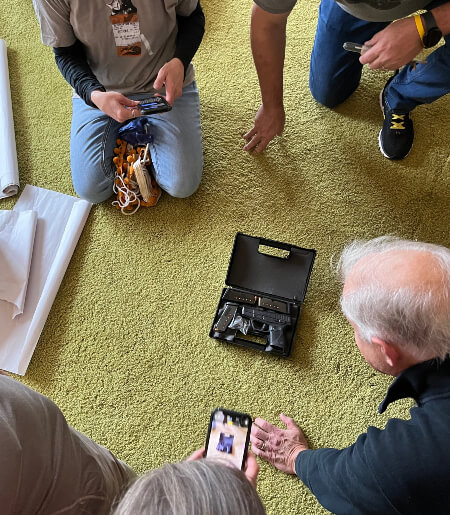
All of us keeping our distance from our dad’s secret purchase
When our father died, we found among his possessions recent receipts for a handgun and gun training. We were all surprised, including our mother, who knew nothing about it. Thus began a mission to find the gun—a mission spearheaded by our brother Jeff.
‘Every time I’ve come home since, I’ve been determined to find it.’
“Every time I’ve come home since, I’ve been determined to find it,” he said before we jumped into the weekend of cleaning. “This time, I will find it.”
And so he did.
On Saturday afternoon, we heard a shout from my father’s office, where Jeff had been going through mounds of papers and books. “Everyone, meet in the living room!” he exclaimed. He walked down the stairs with a small black case under his arm and a look of triumph on his face. He lifted up the case. “I got it!” It had been underneath papers in the bottom drawer of a cabinet.
He knelt on the carpet and unzipped the case. Inside was a semi-automatic handgun—a 9mm Taurus, Jeff informed us—with a couple magazines full of bullets. We all stood in a circle looking down in awe. We never imagined our father as a gun toter, but he had grown concerned about a coming revolution before he died.
“Oh no,” I shouted. “You know Chekov’s rule. If a gun is introduced, it has to be used by the end of the play.” We still had a day and a half of cleaning to do, and Jack and I still hadn’t settled on ownership of the VW convertible. Ruh-roh.
Read More: Selling Your Childhood Home: Does a House Make a Family?
The Cape
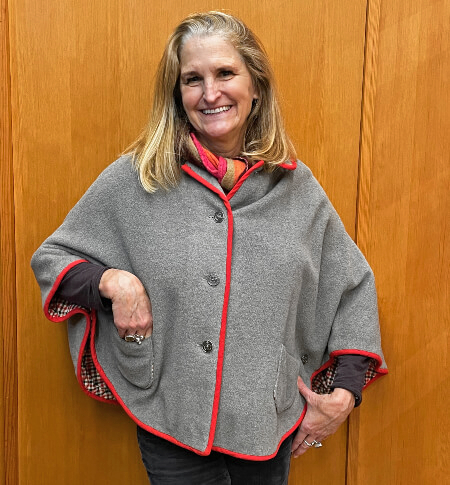
Shopping my childhood closet
In the walk-in closet of the guest room (which had once been my room), our mother kept an assortment of old clothes. Thankfully, she had already removed most of my father’s suits since for me, it would hurt too much to see them. During our cleaning project, I ended up working in the closet. I found an old prom dress of mine and some beautiful dresses and suits Mom used to wear (during our time in Switzerland, a dressmaker designed clothing for her).
In boxes on a shelf, we came across clothes that were worn by one of us at some point, often by many of us since we were a hand-me-down kind of family. We found natty outfits that Jack wore as a baby; some were in good enough shape that he took them with him for his new grandson, also named Jack. I found a flowered red crop top that I wore when I was about 10 or so. I was swamped with memories of wearing it on a family vacation on the Outer Banks of North Carolina, where we went every year. I could even hear the soundtrack of that summer, which included “Song Sung Blue” by Neil Diamond. Our funniest find was an old T-shirt that reads, “Spiro Agnew: A Great American” and features a smirking image of the long-ago-disgraced vice president.

The little crop top that brought back memories of a beach trip when I was 10. How did Spiro Agnew become part of the family treasure?
The absolute best discovery was a gray wool cape with red piping and a red-and-black-checked lining that my mom made, one of two matching ones she created for me and my older sister Janyce. This was the larger one. I remember wearing that cape (the smaller one and then the larger one when I grew into it) for many winters. I loved the European chic of it—not like anything seen in my hometown in the mountains of East Tennessee.
The cape we found looked like it might be big enough for me to slip into, so I put it on. It fit, not a dramatic cape any longer, but a, uh . . . capelet. The hem hit between my elbow and wrist, which I think is acceptable. When I stepped out of my old bedroom and walked down stairs to the kitchen to show it off, two of my nieces were there. “It’s perfect,” I said.
Without missing a beat one of my nieces, a wag, said, “Yeah, perfect for crossing the Alps to escape the Nazis.” The assembled family members cracked up. But I won’t let that deter me. I packed up the cape in my suitcase and am determined to wear it in New York City, where, after all, anything goes.
The Hug
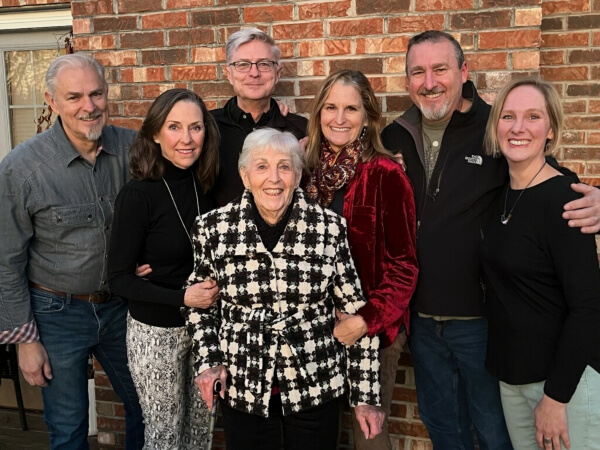
Our mother Jeannette surrounded by her six kids. From left: Jack, Janyce, Jeff, Jeannie, Jim, and Judi.
On Sunday afternoon, we were almost finished with the project, making better progress than we could have imagined. Jeff had run many carloads of trash and recycling to the respective depositories in our hometown. Janyce was going to call the Salvation Army to pick up the things we were donating and have an estate planner come to assess the rest of the items. Everyone but me had loaded their stash of goods—the toys, clothes, wall hangings, books, spoons, dishware they’d claimed—into their cars (I was flying home). My booty was stowed in the now-empty walk-in closet of the guest room (including my dad’s old leather football helmet from high school, which I will treasure).
Jeff was going to drive our mother, who had been part of the project on and off during the weekend, back to her apartment. As my mom exited the house through the garage, we all came down to say goodbye. We surrounded her in a circle with our arms clasped around each other. “We love you, Mom,” Jeff said, and we all echoed the sentiments.
Mom looked so small in the center; at 93, she has shrunk significantly. But she was beaming, ecstatic, and why wouldn’t she be? Six children who adore her and each other. I thought then how I should be so lucky when I’m that age.
The sadness was eased by going through this terrible rite of passage together, unified.
We huddled a little longer like that, and surprisingly no one cried right then. Yes, there had been some crying over the weekend—Judi, when she claimed Dad’s favorite rocking chair; when we went through our Christmas ornaments in much the same way we’d gone through the spoons; Jeff, when he read the telegrams sent to our grandmother when her husband (our father’s father) was killed in a train crash. But only brief moments of sadness here and there.
Maybe, I thought, the difference between my solo walk through the house in September and this weekend cleaning it out was that the house was once again loud and noisy and throbbing with life. Plus, the burden, the sadness was eased by going through this terrible rite of passage together, unified.
“Why do you think we get along so well?” I asked several siblings over the weekend. “Because we want to honor our mother and father,” Jeff answered. “Because Dad set such a good example of having a long-lasting relationship with his [seven] brothers and sisters,” Judi said. “Look how they always got together and had so much fun.”
We finally, reluctantly broke the circle around our mother, and she headed to my brother’s car. We’d soon all be dispersing as well, back to our own corners of the country. But what we had accomplished here over these three days would not be forgotten. We had cleaned out our house, and in the process, we made way for something else—a renewed commitment to each other as siblings. We understood that it was now up to us. We were the keepers of the material items of our family history and the memories but also the spirit of what our parents had bequeathed to us, which we, in turn, were giving to our own families: the certainty that the bonds of DNA should always be honored and celebrated.
But still, as Mom and Jeff drove away and the rest of us headed back through the garage into the house, I placed a small green sticker with my initials on the hood of the VW bug.
Read More: The 4 Best Lessons I Learned from My Fun-Loving Dad

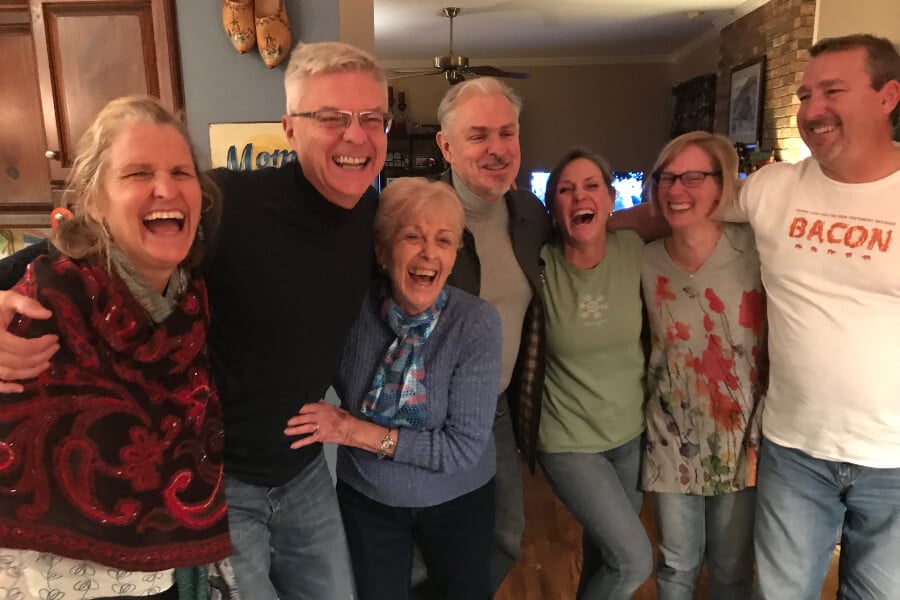





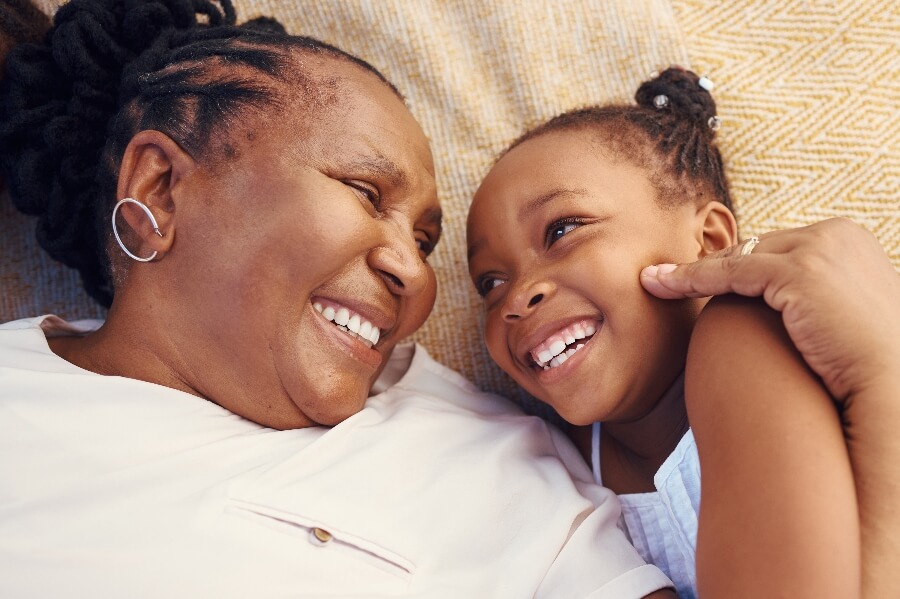













0 Comments